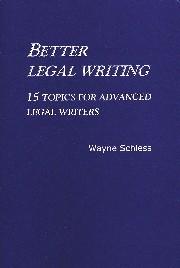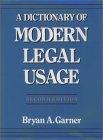If you are committed to better legal writing, you'll want to spread it around and get others involved. Besides, you may be the "writing guru" at your office, and you'd like a break from editing so many other people's documents or answering their questions. Naturally, you could sponsor a seminar. This is shameless self-promotion of course, but you could hire me to come give a seminar on better legal writing. Here are some other things you can do.
Hire an in-house editor or writing specialist. Some law offices have them, and they're glad they do. This expert in professional writing can teach general classes to everyone so that writing improves across the board. This expert can train supervisors to spot the large-scale weaknesses and train junior lawyers to edit themselves. (That's how it should be, right? The most experienced and highest paid should not be line-editing others' work; instead, junior lawyers should be trained to do that themselves. Then senior lawyers can focus on the bigger picture: strategy, overall approach, and staffing of writing projects.) This writing expert will also promote a culture of high expectations for writing in your office.
Start a writing group. Select or invite a group of lawyers to meet over lunch once a week to discuss good writing. Have everyone take a turn offering a document for the group to read in advance and then discuss at the meeting. You get two benefits: the writing IQ of everyone in the group is bound to increase, and you will learn that accepting constructive feedback is a great way to improve your writing.
Create a house style manual or, better yet, adopt one. I recommend
The Redbook, by Garner, but you have other choices. Having a reliable and consistent source for answering writing questions will raise the writing IQ of everyone who consults it, and it will help settle many small writing skirmishes that can flare up at the office.
Consider using a writing test to screen job applicants. It may seem harsh, but it works; as reported in the National Law Journal in 1999, one Chicago law firm swears by it.[1] Legal-writing expert Joseph Kimble has recommend the practice in a recent article,[2] and Bryan Garner has created and published a test that would serve any law office well as a screen for an applicant’s writing ability.[3]
1. Ritchenya Shepherd,
Firm Exam Tests Writing Skills, Natl. L. J. A16 (Feb. 15, 1999).
2. Joseph Kimble,
The Best Test of a New Lawyer’s Writing, 80 Mich. B.J. 62 (July 2001).
3. Bryan A. Garner,
The Legal-Writing Skills Test, 5 Scribes J. Leg. Writing 107 (1994-1995).




